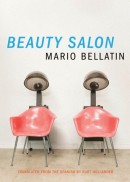Every Thursday on the blog (hey, it’s still Thursday in parts of the country) brings a post about a paperback book.
 A few weeks ago, the New York Times profiled Mexican author Mario Bellatín, who has written “a score of novellas” over the past 25 years, but is largely unknown in the U.S. Beauty Salon was first published in 1994, and the English translation — by Kurt Hollander — appeared earlier this year. It’s a 63-page book, on very small pages, literally pocket-sized.
A few weeks ago, the New York Times profiled Mexican author Mario Bellatín, who has written “a score of novellas” over the past 25 years, but is largely unknown in the U.S. Beauty Salon was first published in 1994, and the English translation — by Kurt Hollander — appeared earlier this year. It’s a 63-page book, on very small pages, literally pocket-sized.
The story’s unnamed narrator is a hairdresser whose salon has been converted into “the Terminal,” a place where those dying of a (also unnamed) contagious disease come to spend their last days. In its prime, the shop was decorated with several stunning aquariums, and the owner and two of his employees (all three transvestites) would sneak around the city on sexual adventures. Now, only one tank still holds fish, and it’s so murky that it’s impossible to tell how many are inside. The AIDS-like affliction has spread far and wide.
The book’s epigraph comes from Kawabata Yasunari: “Anything inhumane becomes human over time.” That’s a good indication of what’s to come, in part: a study in how exposure to ceaseless death inures one to it.
Initially, the narrator seems more than detached; he seems to take some kind of perverse pleasure in the suffering of others, as when he describes his preferred brand of patient: “I don’t really know how to describe this state, although it’s something like a total lethargy in which even the possibility of them inquiring about their own health no longer exists. This is the ideal state in which to work.” He selfishly wishes that the dying and their families, who already express their thanks and give the narrator more money than he needs to keep the operation running, would “express their gratitude in a more tangible way.” And then there’s his policy on female patients:
The Terminal underwent a crisis when several women came to ask me to let them die there. They came to the salon in very bad condition. Some were holding small children also ravaged by the disease. I stood firm from the very beginning. The beauty salon had once been dedicated to beautifying women and I wasn’t willing to sacrifice so many years of work. Which is why I never accepted anyone that wasn’t a man, regardless of how much they pleaded.
But when the narrator refers to the first sick person who ever arrived at his door, it is clear his initial attitude was considerably less cold. In that instance:
I remember how we all almost went crazy trying to revive him. We brought in doctors, nurses and herbalists, and we even went to visit some witch doctors. We took up a collection among friends to buy him some very expensive medicine.
Looking back at the young man’s death, he says, “The end was simple. There was no cure. All our efforts were merely vain attempts to ease our conscience.” The story’s lack of specificity makes it clearly intended as a fable of sorts, but in our year of “death panels” there’s easy relevance to be found in the way Bellatín grimly plays with the philosophy of mortality. The narrator briefly mentions the Sisters of Charity, who occasionally show up offering to help, and who he repeatedly turns away:
I imagine how this place would be run by such people, with medicine everywhere, uselessly trying to save lives that were already on death’s list, prolonging suffering under the guise of Christian charity. The worst of it is how hard they would try to demonstrate what a noble sacrifice life is when dedicated to others.
Bellatín is without a part of his right arm, which the critic Francisco Goldman (a friend of the author’s) refers to when he says:
People often say, with a lot of truth to it, that all good fiction writing comes from some wound, out of some distance that needs to be breached between a writer and normalcy. In Mario’s sense, the wound is literal and comes with all kinds of psychological nuance and pain, and seems related to sexuality and desire, the desire for a whole body. One of my favorite aspects of him is this sense that he is writing for all the freaks — either literally freaks or privately and metaphorically, that he really touches us.
It’s a bit of a stretch for Beauty Salon to exist as a stand-alone book. Though it might mirror classics like Camus’ The Plague in its conceit, it’s hardly damning Bellatín to say that his story is slighter in depth as well as length. But read alongside several other of his many novellas, I imagine the power of Beauty Salon’s cold tone and subtler themes would have a greater effect, so I hope the translations keep coming.

